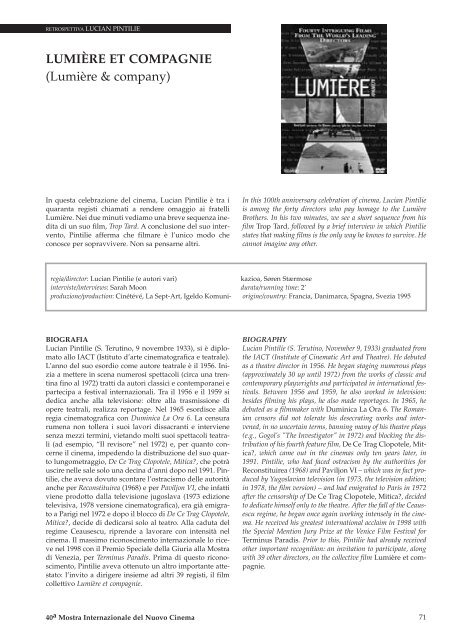download document - Mostra internazionale del nuovo cinema
download document - Mostra internazionale del nuovo cinema
download document - Mostra internazionale del nuovo cinema
You also want an ePaper? Increase the reach of your titles
YUMPU automatically turns print PDFs into web optimized ePapers that Google loves.
RETROSPETTIVA LUCIAN PINTILIE<br />
LUMIÈRE ET COMPAGNIE<br />
(Lumière & company)<br />
In questa celebrazione <strong>del</strong> <strong>cinema</strong>, Lucian Pintilie è tra i<br />
quaranta registi chiamati a rendere omaggio ai fratelli<br />
Lumière. Nei due minuti vediamo una breve sequenza inedita<br />
di un suo film, Trop Tard. A conclusione <strong>del</strong> suo intervento,<br />
Pintilie afferma che filmare è l’unico modo che<br />
conosce per sopravvivere. Non sa pensarne altri.<br />
In this 100th anniversary celebration of <strong>cinema</strong>, Lucian Pintilie<br />
is among the forty directors who pay homage to the Lumière<br />
Brothers. In his two minutes, we see a short sequence from his<br />
film Trop Tard, followed by a brief interview in which Pintilie<br />
states that making films is the only way he knows to survive. He<br />
cannot imagine any other.<br />
regia/director: Lucian Pintilie (e autori vari)<br />
interviste/interviews: Sarah Moon<br />
produzione/production: Cinétévé, La Sept-Art, Igeldo Komunikazioa,<br />
Søren Stærmose<br />
durata/running time: 2’<br />
origine/country: Francia, Danimarca, Spagna, Svezia 1995<br />
BIOGRAFIA<br />
Lucian Pintilie (S. Terutino, 9 novembre 1933), si è diplomato<br />
allo IACT (Istituto d’arte <strong>cinema</strong>tografica e teatrale).<br />
L’anno <strong>del</strong> suo esordio come autore teatrale è il 1956. Inizia<br />
a mettere in scena numerosi spettacoli (circa una trentina<br />
fino al 1972) tratti da autori classici e contemporanei e<br />
partecipa a festival internazionali. Tra il 1956 e il 1959 si<br />
dedica anche alla televisione: oltre alla trasmissione di<br />
opere teatrali, realizza reportage. Nel 1965 esordisce alla<br />
regia <strong>cinema</strong>tografica con Duminica La Ora 6. La censura<br />
rumena non tollera i suoi lavori dissacranti e interviene<br />
senza mezzi termini, vietando molti suoi spettacoli teatrali<br />
(ad esempio, “Il revisore” nel 1972) e, per quanto concerne<br />
il <strong>cinema</strong>, impedendo la distribuzione <strong>del</strong> suo quarto<br />
lungometraggio, De Ce Trag Clopotele, Mitica, che potrà<br />
uscire nelle sale solo una decina d’anni dopo nel 1991. Pintilie,<br />
che aveva dovuto scontare l’ostracismo <strong>del</strong>le autorità<br />
anche per Reconstituirea (1968) e per Paviljon VI, che infatti<br />
viene prodotto dalla televisione jugoslava (1973 edizione<br />
televisiva, 1978 versione <strong>cinema</strong>tografica), era già emigrato<br />
a Parigi nel 1972 e dopo il blocco di De Ce Trag Clopotele,<br />
Mitica, decide di dedicarsi solo al teatro. Alla caduta <strong>del</strong><br />
regime Ceausescu, riprende a lavorare con intensità nel<br />
<strong>cinema</strong>. Il massimo riconoscimento <strong>internazionale</strong> lo riceve<br />
nel 1998 con il Premio Speciale <strong>del</strong>la Giuria alla <strong>Mostra</strong><br />
di Venezia, per Terminus Paradis. Prima di questo riconoscimento,<br />
Pintilie aveva ottenuto un altro importante attestato:<br />
l’invito a dirigere insieme ad altri 39 registi, il film<br />
collettivo Lumière et compagnie.<br />
BIOGRAPHY<br />
Lucian Pintilie (S. Terutino, November 9, 1933) graduated from<br />
the IACT (Institute of Cinematic Art and Theatre). He debuted<br />
as a theatre director in 1956. He began staging numerous plays<br />
(approximately 30 up until 1972) from the works of classic and<br />
contemporary playwrights and participated in international festivals.<br />
Between 1956 and 1959, he also worked in television:<br />
besides filming his plays, he also made reportages. In 1965, he<br />
debuted as a filmmaker with Duminica La Ora 6. The Romanian<br />
censors did not tolerate his desecrating works and intervened,<br />
in no uncertain terms, banning many of his theatre plays<br />
(e.g., Gogol’s "The Investigator" in 1972) and blocking the distribution<br />
of his fourth feature film, De Ce Trag Clopotele, Mitica,<br />
which came out in the <strong>cinema</strong>s only ten years later, in<br />
1991. Pintilie, who had faced ostracism by the authorities for<br />
Reconstituirea (1968) and Paviljon VI – which was in fact produced<br />
by Yugoslavian television (in 1973, the television edition;<br />
in 1978, the film version) – and had emigrated to Paris in 1972<br />
after the censorship of De Ce Trag Clopotele, Mitica, decided<br />
to dedicate himself only to the theatre. After the fall of the Ceausescu<br />
regime, he began once again working intensely in the <strong>cinema</strong>.<br />
He received his greatest international acclaim in 1998 with<br />
the Special Mention Jury Prize at the Venice Film Festival for<br />
Terminus Paradis. Prior to this, Pintilie had already received<br />
other important recognition: an invitation to participate, along<br />
with 39 other directors, on the collective film Lumière et compagnie.<br />
40 a <strong>Mostra</strong> Internazionale <strong>del</strong> Nuovo Cinema<br />
71
















